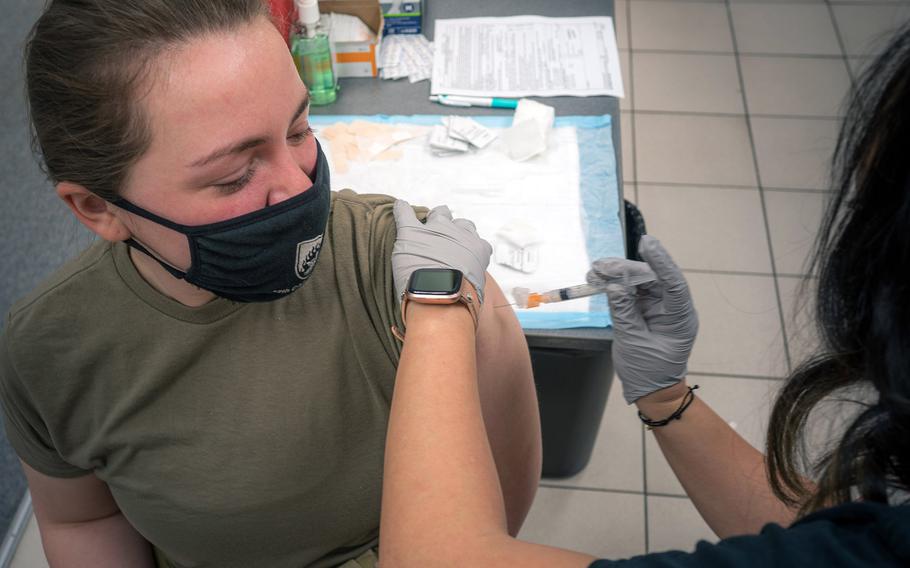
Army Spc. Alyssa Lore, a UH-60 Black Hawk crew chief with the 12th Combat Aviation Brigade, receives her second COVID-19 vaccine dose in February 2021 in Wiesbaden, Germany. More doses should arrive soon following a slow start to the Europe vaccination campaign, U.S. European Command's Gen. Tod Wolters told Congress on April 15, 2021. (Robert Fellingham/U.S. Army)
Stars and Stripes is making stories on the coronavirus pandemic available free of charge. See more staff and wire stories here. Sign up for our daily coronavirus newsletter here. Please support our journalism with a subscription.
ATLANTA — The Pentagon later this week will lift its pause on administering the Johnson and Johnson coronavirus vaccine as it seeks to increase its supply amid increasing demand for the inoculations among service members, defense officials said Monday.
The Defense Department plans to restart its use of the single-shot vaccination after federal health officials at the Centers for Disease Control and Prevention and the Food and Drug Administration on Friday recommended the government end a pause in its use for safety concerns, said John Kirby, the Pentagon’s chief spokesman. Health officials, following the 11-day pause, determined the J&J shot’s “known and potential benefits outweigh its known and potential risks,” following reports of rare blood clots in women younger than 50 years old.
“DOD will ensure that all recipients of the vaccine are aware of all known side effects and the potential risks before they receive it,” Kirby told reporters Monday at the Pentagon.
The Defense Department has about 100,000 doses of the J&J vaccine, he said. The return to the use of that vaccine should help Pentagon officials distribute inoculations to troops serving in remote and austere locations primarily in the Asia, eastern Europe, Africa, and Central and South America, other defense officials said Monday.
The J&J vaccine is easier to transport because it can be stored at regular refrigeration temperatures for several months, whereas the versions produced by Pfizer and Moderna require much colder storage and transportation temperatures. Its single dose application is also beneficial for troops forward deployed in locations where is more difficult to send supplies, said Army Brig. Gen. Matthew Smith, who leads the Army’s vaccination operations.
The Army has seen an uptick recently in demand for vaccination amongst its soldiers, Smith said. The news is welcomed to top service officials who have encouraged U.S. troops to volunteer for the coronavirus inoculations. While the Pentagon can make vaccinations fully cleared by the FDA mandatory for troops, it cannot do so for the coronavirus vaccinations while they are authorized only on an emergency basis, unless the president orders it mandatory. President Joe Biden, so far, has ignored calls from some lawmakers to mandate troops receive coronavirus inoculations.
The Pentagon has already administered more than 88% of the coronavirus vaccine doses it now possesses, amid the increasing demand, Smith said, noting all troops, their family members and DOD civilian employees are now eligible for the shots.
“At this point, the demand far outstrips the supply,” Smith said Monday.
As of Wednesday, about 765,000 U.S. troops — roughly 35% of the force, including the National Guard and reservists — had received at least one coronavirus shot, according to Pentagon data. In the Army, 144,746 soldiers had been fully vaccinated and another 136,614 soldiers were partially vaccinated, the data shows.
“Every senior [Army] commander out there across the globe, in the continental United States and overseas, wants to protect their force,” Lt. Gen. R. Scott Dingle, the Army’s surgeon general, told reporters Monday. “The contacts I get directly from those commanders is: ‘I want more. I want more.’ Every commander wants it. Everyone wants it yesterday.”
The Army officials declined to say Monday how many soldiers had explicitly turned down opportunities to receive the vaccinations, which they said the Army is not tracking.
However, Dingle said he had seen anecdotal evidence that at least some soldiers who were initially hesitant to receive the jabs had changed their minds, including many working coronavirus-related missions, including administering vaccines.
“We’re visiting every installation, and we're talking to soldiers and leaders [and] medical professionals,” he said. “You hear from some who have questions, who think maybe they should not get it because ... they’re so young. And, then, we hear from some of those young soldiers who say they were convinced to take it after seeing how important it was or how happy it made some of the people they see getting the vaccines. It’s powerful.”
dickstein.corey@stripes.com Twitter: @CDicksteinDC